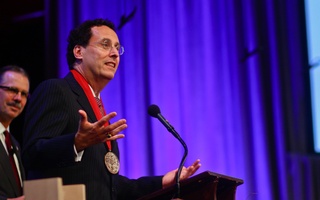At Harvard, we are supposed to get a liberal education. For most of us, this means learning about the occasional Samurai, Bonobo or Greek Hero. But for many, this also means learning about the premiere performances of five of the world's greatest pieces of classical music.
For years, Harvard University Professor of Music Thomas Forrest Kelly has guided undergraduates through the debut performances of Monteverdi's Orfeo, Handel's Messiah, Beethoven's Ninth Symphony, Berlioz's Symphonie Fantastique and Stravinsky's Rite of Spring in his popular core course, First Nights: Five Premiere Performances. This fall, Kelley made a debut of his own when his book, First Nights: Five Premiere Performances, was published by Yale University Press. Prof. Kelley recently sat down with The Crimson to discuss books, music and cybersex.
The Harvard Crimson: Did the idea for First Nights originate at Harvard?
Tom Kelly: No, actually it originated at the Oberlin Conservatory. I was teaching a class called First Nights about these same five pieces, but it was designed for pre-professional conservatory musicians. When I came here, it seemed that a similar course might be a good way to introduce people more generally to classical music and performance. The course and the book are both about what it was like to be present when each of these pieces was on the cutting edge of contemporary music.
THC: How did you become interested in premiere performances, as opposed to the pieces in general?
TK: Part of this comes from my interest in early music, finding out how music sounded when it was new. It's not because you're trying to tell everyone that they must play the piece as it was played at its premiere, but I think that music is most interesting when it's in its originally intended context. Beethoven didn't write his symphonies for musicologists and critics; he wrote it for prospective ticket purchasers. Those were his people. The other aspect is the reinforcement of how exciting performance is. We have CDs, and this is great. We can listen to whatever we want whenever we want. Before 1920 or so, if you wanted to hear music, you had to make it yourself or go to where someone was making music. Music existed only when someone was performing. If a CD performance wasn't good, the CD wouldn't have been issued. But when an orchestra is on stage sweating bullets and no one knows how the music will turn out, there's some excitement.
Read more in Arts
Visual Arts CalendarRecommended Articles
-
ON THE RED PHONE WITH: That KidEveryone talks about not wanting to be “that kid” in section, but few people have actually called him up on
-
Doctorow Pushes for ‘Free Culture’[Editor's note—presented here is a longer version of the Cory Doctorow interview than that which appeared in the print edition
-
SPOTLIGHT: Tracy Kidder '67Tracy Kidder ’67– Pulitzer Prize winner, literary journalist, and Harvard graduate–has been writing award-winning non-fiction for the past 35 years.
-
 15 Questions with Tracy Kidder
15 Questions with Tracy Kidder -
 8 Questions with Tony Kushner
8 Questions with Tony Kushner













